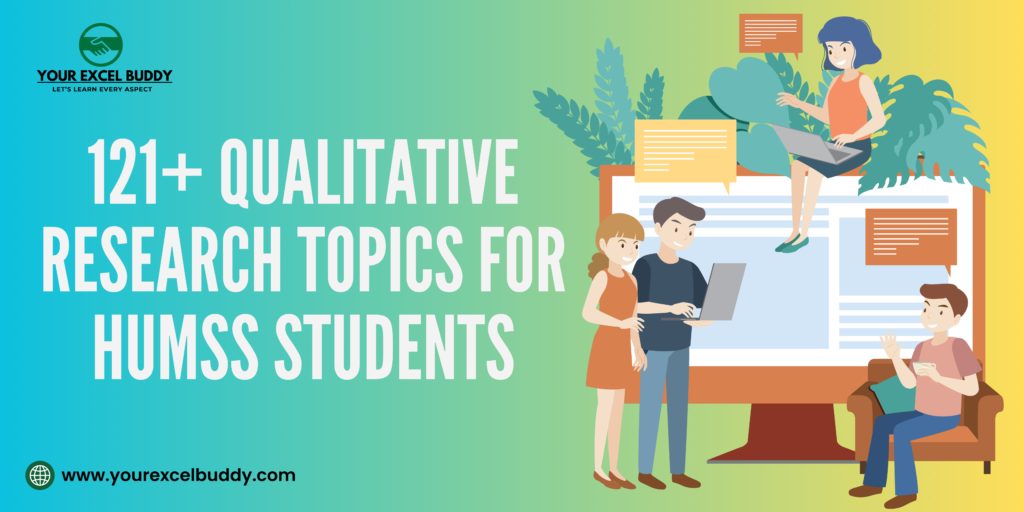
As a Humanities and Social Sciences (HUMSS) student, embarking on a research journey can be both exciting and overwhelming. The selection of a research topic is often the first and most critical step, in laying the foundation for a successful academic inquiry.
Qualitative research, known for its focus on understanding human behavior, culture, and social phenomena, is particularly well-suited for HUMSS students who seek to explore the complexities of society.
In this comprehensive guide, we present 125 qualitative research topics for HUMSS students. These topics cover a wide range of disciplines within the humanities and social sciences, from psychology to literature, education, and politics. Whether you’re interested in cultural dynamics, social justice, or mental health, there’s a topic here to spark your intellectual curiosity and propel your research journey.
What is HUMSS?
HUMSS stands for Humanities and Social Sciences, a senior high school academic track that focuses on the study of human behavior, culture, society, and governance. HUMSS students are typically trained in critical thinking, communication, and analytical skills, preparing them for careers in fields like law, education, psychology, literature, and political science.
By engaging with a variety of subjects like sociology, philosophy, history, and literature, HUMSS students are equipped to analyze complex social issues, engage in discussions about human interactions, and contribute to understanding and solving real-world problems.
Why Qualitative Research Matters for HUMSS Students?
Qualitative research allows HUMSS students to delve deeply into the subjective aspects of human behavior, societal dynamics, and cultural phenomena. Here are a few reasons why qualitative research is essential for HUMSS students:
- Exploring Human Behavior: It provides insights into the motivations, beliefs, and actions of individuals and groups.
- Understanding Cultural Contexts: Qualitative research helps students examine cultural norms, traditions, and social practices.
- Encouraging Critical Thinking: By interpreting complex social issues, students refine their analytical and problem-solving skills.
- Empathy and Awareness: Qualitative research fosters a deep understanding of diverse perspectives, promoting empathy and cultural sensitivity.
- Interdisciplinary Learning: This research method aligns with the interdisciplinary nature of HUMSS, integrating aspects of sociology, psychology, history, and more.
Top 91+ Entrepreneurship Project Ideas for Students: Practical and Profitable
125 Qualitative Research Topics for HUMSS Students
Here’s a curated list of qualitative research topics for HUMSS students, organized by subject area to help you find the perfect focus for your study.
1. Culture and Society
- The impact of social media on traditional cultural practices.
- The role of cultural identity in the assimilation of migrant communities.
- Gender roles and their evolution in contemporary society.
- Exploring cultural appropriation in modern-day fashion and media.
- The effects of globalization on local cultural traditions.
- How media representations shape cultural perceptions of beauty.
- The influence of social media on cultural identity formation.
- Language preservation in Indigenous communities.
- The intersection of popular culture and political activism.
- The significance of festivals in maintaining cultural heritage.
2. Education and Learning
- The role of technology in transforming classroom dynamics.
- How socio-economic status influences access to education.
- The effectiveness of alternative learning systems in developing countries.
- The role of parental involvement in academic achievement.
- Gender disparities in education: Challenges and solutions.
- The impact of arts education on student creativity and innovation.
- The use of experiential learning in enhancing student engagement.
- Culturally responsive teaching and its impact on student performance.
- The role of educational policy in promoting inclusive education.
- The effects of online learning on student collaboration and participation.
3. Psychology and Mental Health
- Social media’s influence on adolescent mental health.
- Coping strategies of students experiencing academic pressure.
- Gender differences in emotional intelligence and its effects on relationships.
- The psychological impact of bullying on adolescent self-esteem.
- The role of family dynamics in the development of social anxiety.
- Cross-cultural comparisons of mental health stigma.
- The influence of trauma on coping mechanisms in young adults.
- Exploring the role of resilience in mental health recovery.
- Psychological effects of the pandemic on adolescents.
- The role of peer support in addressing mental health issues.

4. Politics and Governance
- Youth involvement in political activism in the digital age.
- The effectiveness of social media campaigns in influencing elections.
- Gender representation in government leadership roles.
- How media framing affects public opinion on social issues.
- The role of grassroots movements in shaping public policy.
- The role of NGOs in promoting human rights in developing countries.
- Analyzing political polarization in modern democracies.
- The influence of corruption perceptions on electoral outcomes.
- Media bias and its impact on political discourse.
- The role of civil society in holding governments accountable.
5. History and Memory
- Collective memory and its role in shaping national identity.
- Oral history as a tool for preserving indigenous heritage.
- The role of monuments and memorials in public memory.
- Re-examining colonial history through indigenous perspectives.
- The role of women in shaping historical narratives.
- Historical revisionism and its impact on national identity.
- The role of museums in preserving cultural history.
- The influence of historical trauma on contemporary identity.
- The significance of digital archives in preserving historical documents.
- How historical narratives are reshaped in modern times.
6. Media and Communication
- The role of social media in amplifying marginalized voices.
- The influence of fake news on public trust in journalism.
- The impact of media representations on gender identity.
- Exploring the rise of alternative media in shaping public opinion.
- The role of celebrity endorsements in social media activism.
- Media portrayals of mental health in television and film.
- The effectiveness of digital marketing strategies on consumer behavior.
- How public relations influence crisis management in corporations.
- The influence of media literacy on young adults’ critical thinking skills.
- The role of journalism in a post-truth society.
7. Social Justice and Equity
- Gender-based violence in different cultural contexts.
- The intersectionality of race, gender, and class in social justice movements.
- Disability rights and the push for more inclusive policies.
- The role of intersectionality in LGBTQ+ activism.
- Addressing the healthcare disparities in marginalized communities.
- How environmental justice movements impact public policy.
- The role of economic inequality in shaping societal divisions.
- Racial profiling in law enforcement practices.
- Indigenous land rights movements and the fight for sovereignty.
- The impact of refugee policies on immigrant integration.
8. Environmental Studies
- The role of indigenous knowledge in environmental conservation.
- How grassroots movements shape environmental policy.
- The impact of climate change on rural farming communities.
- Exploring sustainable urban development strategies.
- The role of youth in global environmental activism.
- Media representation of climate change and its effects on public opinion.
- The role of renewable energy in reducing environmental degradation.
- Public perceptions of plastic pollution and its solutions.
- Climate refugees: Challenges and policy responses.
- The effects of deforestation on biodiversity conservation.
9. Healthcare and Well-being
- Cultural perspectives on alternative medicine practices.
- Exploring healthcare access in low-income communities.
- The effects of an aging population on healthcare systems.
- Public perceptions of mental health services in underserved areas.
- Integrating traditional healing practices into modern healthcare.
- The psychological impact of long-term caregiving on family members.
- Public health interventions in managing infectious diseases.
- The role of diet and nutrition in promoting mental well-being.
- Gender disparities in access to reproductive health services.
- The influence of spirituality on mental health resilience.
10. Gender and Sexuality Studies
- Gender identity development in non-binary individuals.
- The role of feminism in challenging traditional gender norms.
- Reproductive rights and access to healthcare in developing nations.
- The effects of toxic masculinity on mental health.
- The role of LGBTQ+ representation in mainstream media.
- How gender roles are portrayed in contemporary literature.
- The role of intersectionality in feminist activism.
- Gender-based violence: Prevention and intervention strategies.
- The influence of social media on sexual identity formation.
- Challenging heteronormativity in academic research.
11. Migration and Identity
- The role of cultural hybridity in shaping immigrant identities.
- Identity negotiation in second-generation immigrant communities.
- The experiences of undocumented migrants in accessing healthcare.
- Exploring the challenges of diaspora communities in preserving cultural identity.
- The influence of language acquisition on migrant integration.
- Refugee experiences and their impact on identity formation.
- How immigration policies shape the lived experiences of migrants.
- The effects of economic migration on family dynamics.
- Exploring the role of social networks in immigrant adaptation.
- The influence of border politics on migrant identity.
12. Literature and Language
- Representation of marginalized voices in postcolonial literature.
- Gender dynamics in Shakespearean works.
- The role of translation in shaping cross-cultural understanding.
- Exploring linguistic diversity in multilingual societies.
- The intersection of language and power in contemporary literature.
- The role of folklore in preserving cultural narratives.
- Literary censorship and its impact on freedom of expression.
- Representation of mental health in contemporary literary works.
- How gender roles are depicted in classic literature.
- The role of oral traditions in shaping cultural memory.
13. Religion and Spirituality
- The role of religion in shaping gender roles within different cultures.
- Exploring the intersection of religion and politics in modern societies.
- The role of spirituality in coping with trauma and loss.
- The influence of religious institutions on public policy.
- Exploring religious pluralism in contemporary societies.
70+ Side Project Ideas For Final Year Students
Conclusion
Qualitative research topics for HUMSS students provide a rich opportunity to explore the complexities of human behavior, societal structures, and cultural phenomena. By engaging with these diverse topics, students can develop critical thinking, cultural awareness, and a deeper understanding of the world around them.
Whether delving into literature, politics, education, or psychology, each topic offers a meaningful way to contribute to academic discourse and societal progress. Through thoughtful exploration, HUMSS students can foster empathy, broaden their perspectives, and make lasting contributions to the fields of humanities and social sciences.
FAQs
1. What is a qualitative research topic in HUMSS?
A qualitative research topic focuses on exploring complex social phenomena, human behavior, and cultural dynamics through non-numerical data such as interviews, observations, and narratives. These topics are ideal for HUMSS students, who often study humanities and social sciences.
2. How do I choose the best qualitative research topic for HUMSS?
Start by identifying your personal interests and passions within the field of humanities and social sciences. Then, consider current societal issues and academic relevance. Consult with your teachers or mentors for feedback and evaluate the feasibility of the research in terms of resources and time.
3. Why is qualitative research important for HUMSS students?
Qualitative research enables HUMSS students to explore in-depth social, cultural, and behavioral phenomena. It encourages critical thinking, empathy, and a deep understanding of human interactions, which are essential skills in the humanities and social sciences.
4. What is the difference between qualitative and quantitative research?
Qualitative research focuses on understanding the why and how of human behavior, using non-numerical data like interviews and observations. Quantitative research, on the other hand, involves numerical data and statistical analysis to identify patterns and correlations.
5. How do I conduct qualitative research as a HUMSS student?
To conduct qualitative research, start with a literature review to identify gaps in knowledge. Define clear research objectives, select appropriate methods like interviews or case studies, and ensure ethical considerations are met. Analyze the data systematically to draw meaningful conclusions.

